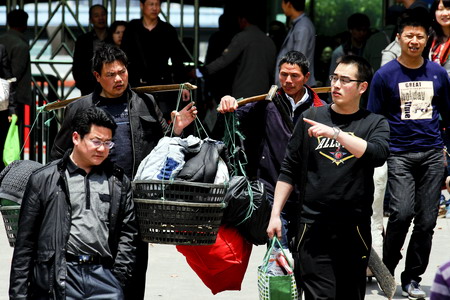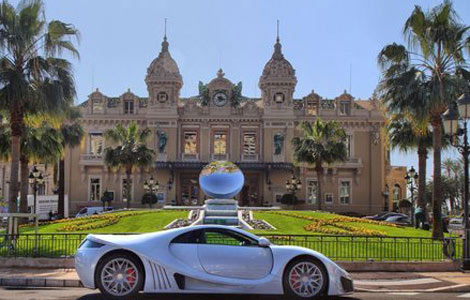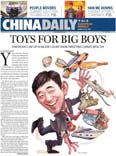Economy
Difference in incomes to resume widening trend
Updated: 2011-04-20 13:45
By Chen Jia (China Daily)
|
 |
|
Migrant workers walk on the streets of Shaoxing city, East China's Zhejiang province, on Monday. [Photo / China Daily] |
BEIJING - The difference between incomes made by rural and urban residents in China narrowed slightly in 2010 but is expected this year to resume a tendency to become ever larger, according to a host of China's economic think tanks.
The average incomes of urban resident in 2010 were 3.23 times as great as those earned by their rural compatriots in the same year. That meant that specific measure of income disparities had decreased by 0.1 percent from where it had been in 2009, according to the 2011 Green Book on the Rural Economy, which was jointly published on Tuesday by the Chinese Academy of Social Sciences' rural development institute, the National Bureau of Statistics' department of rural social and economic survey, and the Social Sciences Academic Press.
To those who want the difference in income to become even smaller, the report offered little reason for hope. Rather than predicting further decreases, it held that the difference in incomes will rise to 326 percent this year.
| ||||
"We have narrowed the differences among the incomes made by rural residents in different regions," Zhu Gang, a professor of the rural development institute under the Chinese Academy of Social Sciences, said at a news conference on the report on Tuesday.
"But the differences between the incomes of rural and urban residents remain unsatisfactory."
In 2010, for the first time since 1998, rural residents' incomes rose faster than urban residents' incomes, according to the report.
"The regularly increasing prices of agricultural products and increasing wage incomes are the main causes of the rise in rural residents' incomes," said Zhang Hongyu, a senior official of the Ministry of Agriculture.
The incomes of urban and rural residents continued to increase in the first quarter of the year, according to the National Bureau of Statistics.
In the first three months of the year, the disposable income of urban residents per capita rose to 5,963 yuan ($913), up 12.3 percent from the previous year, although the subsequent deduction of an inflation variable left the actual growth at 7.1 percent, Sheng Laiyun, a spokesman for the National Bureau of Statistics, was quoted by Xinhua News Agency as saying.
At the same time, the incomes of rural residents per capita rose to 2,187 yuan, a 20.6 percent increase over what they had been in the same period of the last year, meaning the rise in rural incomes outpaced that of urban incomes in the first quarter. After inflation was taken into account, the actual increase for rural incomes was of 14.3 percent, Sheng said.
By the end of 2010, 26.88 million people deemed to be poor were living in rural areas, 9.09 million fewer than in 2009, according to the National Bureau of Statistics.
China's Gini coefficient, an indicator of inequality, is approaching 0.5. Throughout the world, a commonly recognized "red line", or point where society should start to be worried, is 0.4, while 0 represents an equal distribution of national wealth.
The coefficient's approach to that important threshold has already incited debate on the Internet. Many netizens contend that enough evidence exists to show that the rich are becoming richer and the poor poorer in China and that the government should take steps to lessen such differences.
E-paper

Han me downs
Traditional 3,000-year-old clothes are making a comeback.
Reaching out
Fast growth fuels rise in super rich
Chinese tourists spend more
Specials

25 years after Chernobyl
Belarus, Ukraine and Russia will mark the 25th anniversary of the nuclear reactor explosion in Chernobyl.

Luxury car show
The world's most prestigious luxury, sports cars and supercars are displayed in Monaco.

Peking Opera revival
Traditional opera is enjoying a revival in Beijing thanks to some modern touches.




